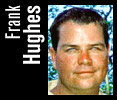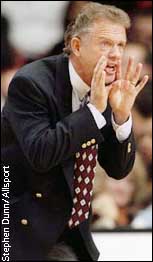
| Sunday, November 21
By Frank Hughes
Special to ESPN.com |
|
Want to know who has the best job in the NBA?
You would think it was the players, wouldn't you, given their salaries and their, um, perks and the fact that, hey, they play basketball for a living.
|  | | Jim Lynam is enjoying life as an assistant with the Nets. |
But that is not the case. No, players have pressures, players have wear
and tear on their bodies, players have demands.
It sucks to be a player.
To ascertain the best job in the NBA, look to the bench. Look at the head coach. Then, on a good number of teams, look directly to his left. Quite
often, there is a middle-aged-to-older gentleman called an assistant coach
sitting there.
That is the dude who is loving life.
Not every team has one of these assistants. Some coaches hire only
up-and-coming, inspired, go-get-'em assistants who are trying to make a name for themselves, trying to eventually -- not necessarily usurp the position of their bosses, but certainly trying to get a job of equivalent status -- and if it comes at the expense of the man who hired you, well, so be it.
But these other coaches of whom I speak, usually they've been there in the head job, and invariably, as is always the case in this league, they have
been fired.
More than likely, they will never be hired as a head coach again. And even more likely, they don't want to be.
Here is a list of the type of coach I'm talking about: Phil Johnson in
Utah, Bill Blair in Cleveland, Bob Staak and Paul Westhead in Golden State, Frank Hamblen in Los Angeles, Bob Weiss in Seattle, Jim Lynam in New Jersey, Butch Beard in Washington, Pete Carril in Sacramento and Don Chaney and Brendan Malone in New York.
I'm not saying every one of them fits my profile, but I guarantee a
goodly number are right up there.
The thing about them is this: They don't care anymore. They don't need the NBA. They are in it because they enjoy it, and because it pays extremely well considering they are doing, well, not a great deal. But if it ended tomorrow, oh well, see ya on the golf course.
This kind of attitude comes only with age and experience. I may be off
base here, but epiphanies generally don't occur to 35-year-olds.
As an analogy, take Mike Ditka. It took a heart attack for him to realize
that he was taking his job way too seriously. You think the 1984 version of
Mike Ditka would have given up every draft pick he owned for Ricky Williams, then showed up at the ensuing press conference looking like a cross between Rapunzel and Fred Sanford?
Highly unlikely.
(OK, I have to submit an addendum here, though. When I was covering the Washington Bullets a few years ago, they had hired a guy named Buzz Braman as a "shooting coach." You might remember him. He was the guy who initially was hired by the Orlando Magic to improve Shaquille O'Neal's free-throw shooting. Obviously, he was not very good at his job.
Anyway, this guy had the best job in the NBA, at least for the few seasons he endured. The Washington players used to joke that his only job was to set up shooting drills and count, "One, two, three," for each time a player made a basket.
His specialty was trick shots. He took untold thousands of dollars from
Calbert Cheaney with a shot where he would throw the ball off a backboard on the side of the court and make it into one of the main baskets. Day after day he would bet Cheaney, and day after day he would win. Cal is not too swift.
Anyway, we were in Indianapolis one day, and during a timeout, while the rest of the team was in the huddle, Buzz was looking up into the rafters of
Market Square Arena. Somebody sitting next to Bullets GM Wes Unseld was trying to figure out what Buzz is looking at.
"Probably trying to figure out how to bank one in off the ceiling," Wes
said.
(Buzz was let go soon thereafter.)
Anyway, back to those assistants. My point is this: Since they no longer
want to be a head coach, and know what that takes, they probably are the only ones who are fully enjoying their NBA experience right now, able to live in the moment because they have the objectivity to do so.
It's hard to live in the moment when you are always worried about becoming a head coach, like the younger assistants. And it's hard to live in the moment when your job always is on the line, like the head coaches.
But these guys don't even want to be head coaches. I was in New Jersey the other day, and I said to Lynam: "Rumor has it you're going to be the next head coach of the Nets."
"That's not why I got back into this," he said.
And why should he? No pressure. He, and all the others, don't have to deal with the media, or the scrutiny, or the criticism. Last one in the locker
room, first one out. If they happen not to make it practice and someone asks why, hey, they're out scouting. Who's gonna know the difference?
These guys, they could take it or leave it. Watch an NBA huddle with most of the guys I named above. I guarantee, the other assistants are intently listening to the instructions the head coach is giving.
The guys I mentioned are checking out the cheerleaders, or scanning the
crowd for babes, or watching the bloopers on the big screen, or B.S.-ing with the referees, or playing grab-ass or some other innocuous activity.
I don't mean to suggest that they are useless. Quite the contrary, they
serve a serious purpose. They are not a threat to the head coach, so they add a sense of security, of loyalty, of objectivity on matters that might
otherwise be skewed by agendas.
And I don't begrudge them their positions. They earned them through years of hard work. They probably deserve to slack a little bit, enjoy life, become a sort of basketball "consultant."
Where do I sign up?
Frank Hughes covers the NBA for the Tacoma (Wash.) News-Tribune. He is a regular contributor to ESPN.com. |  |

 Fouled Out: Who needs the Buffoon?
Fouled Out: Who needs the Buffoon?
